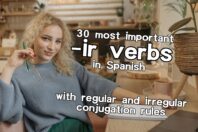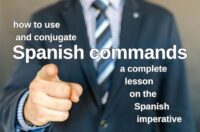Conditional Tense Spanish: The Ultimate Guide For Beginners

Get our free email course, Shortcut to Conversational.
Have conversations faster, understand people when they speak fast, and other tested tips to learn faster.
More infoEven as a beginner, learning how to speak in the conditional (specifically the simple conditional tense Spanish) is one of the easier concepts to understand, and it can be put to use right away whether you wish to make a request, order a coffee or you’re speaking with a friend.
In some ways, the conditional can act as a friendlier, less direct alternative to using the Spanish Imperative mood
Forming The Spanish Conditional
In this post, we will cover the simple conditional tense – plus two other ways that you can speak in the conditional:
Simple Conditional:
- I would like to go to Brazil – Me gustaría viajar a Brasil
- I thought you would help me with the homework – Pensé que me ayudarías con la tarea
Conditional Compound:
- I would have preferred the black dress – Yo habría preferido el vestido negro
- You should have bought a new television – Tu deberías haber comprado un nuevo televisor
If Clauses:
- If I had money, I would buy a new computer – Si tuviera dinero, compraría una nueva computadora
- If they practiced more, they would be the best dancers – Si practicaran más, serían los mejores bailarines
What Is The Conditional?
The conditional is a structure that we use to express possibility or probability, wishes, excuses, and even suggestions or requests. It can also be used to talk about things we would do, if a certain action happens (ie. hypothetical situations).
You can think of it as the equivalent of how we use ‘would’, ‘could’, ‘should have’ or ‘probably’ in English.
Let’s take a look at some of the most common instances where you’ll find the conditional being used.
Wishes
- I would like to go to the beach – Me gustaría ir a la playa
- I would like to go to the concert this Saturday – Me gustaría ir al concierto este sábado
Suggestions
- You should wear the red dress -Deberías usar el vestido rojo
- If you like soccer, you should join a soccer team – Si te gusta el fútbol, deberías unirte a un equipo de fútbol
Requests
- Would you mind if I sit here? – ¿Te importaría si me siento aquí?
- Could you bring me some water? – ¿Podrías traerme un poco de agua?
Excuses
- I would invite you to the movies, but I don’t have money – Te invitaría al cine, pero no tengo dinero
- I could make dinner, but I am tired – Yo podría hacer la cena, pero estoy cansada.
The above examples are in the simple conditional.
But there are other conditional forms that you can use to express the same idea, in a different context (e.g. referring to past actions).
Possibility or Probability using if clauses
- If it rains, the grass gets wet – Si llueve, la grama se moja
- If you freeze the water, you get ice – Si congelas el agua, obtienes hielo
- If you touch the fire, you could cry – Si tocas el fuego, podrías llorar
Hypothetical situations
- If I was a millionaire, I would travel the world – Si yo fuera millonaria, viajaría por el mundo
- If I eat all the cake, I would get a stomachache – Si me como toda la torta, yo tendría dolor de barriga
Now that you know where you can use the conditional, we’re going to explain how to speak in the three forms that we previously mentioned.
- Simple Conditional
- Conditional Compound
- If Clauses
1. Simple Conditional Tense Spanish
As we mentioned before, this is one of the simplest Spanish verb tenses that you can learn.
For regular verbs, all you need to do is memorize the following endings, and add them to the infinitive form of the verb.
That’s it. Easy.
Below are the endings for all verbs:
| Personal pronoun | Endings for verbs -AR -ER -IR |
| Yo | -ía |
| Tu | -ías |
| El / Ella | -ía |
| Usted | -ía |
| Nosotros | -íamos |
| Ustedes | -ían |
| Ellos | -ían |
Let’s see how it looks when we add these endings to some of the most common regular verbs.
Personal Pronoun |
Viajar(To Travel) |
Conocer(To know) |
Escribir(To write) |
Escuchar(To listen) |
| Yo | Viajaría | Conocería | Escribiría | Escucharía |
| Tu | Viajarías | Conocerías | Escribirías | Escucharías |
| El / Ella | Viajaría | Conocería | Escribiría | Escucharía |
| Usted | Viajaría | Conocería | Escribiría | Escucharía |
| Nosotros | Viajaríamos | Conoceríamos | Escribiríamos | Escucharíamos |
| Ustedes | Viajarían | Conocerían | Escribirían | Escucharían |
| Ellos | Viajarían | Conocerían | Escribirían | Escucharían |
| Personal Pronoun | Comprar
(To buy) |
Beber
(To drink) |
Abrir
(To open) |
Trabajar
(To work) |
| Yo | Compraría | Bebería | Abriría | Trabajaría |
| Tu | Comprarías | Beberías | Abrirías | Trabajarías |
| El / Ella | Compraría | Bebería | Abriría | Trabajaría |
| Usted | Compraría | Bebería | Abriría | Trabajaría |
| Nosotros | Compraríamos | Beberíamos | Abriríamos | Trabajaríamos |
| Ustedes | Comprarían | Beberían | Abrirían | Trabajarían |
| Ellos | Comprarían | Beberían | Abrirían | Trabajarían |
| Personal Pronoun | Hablar
(To talk) |
Comer
(To eat) |
Vivir
(To live) |
Decidir
(To decide) |
| Yo | Hablaría | Comería | Viviría | Decidiría |
| Tu | Hablarías | Comerías | Vivirías | Decidirías |
| El / Ella | Hablarías | Comería | Viviría | Decidirías |
| Usted | Hablaría | Comería | Viviría | Decidiría |
| Nosotros | Hablaríamos | Comeríamos | Viviríamos | Decidiríamos |
| Ustedes | Hablarían | Comerían | Vivirían | Decidirían |
| Ellos | Hablarían | Comerían | Vivirían | Decidirían |
Example Sentences:
- Viajaría contigo sin duda alguna – I would travel with you without hesitation
- Pensé que me escribirías – I thought that you would write to me
- ¡Viviría en ese país con los ojos cerrados – I would live in that country with my eyes closed!
Irregular Verbs In The Simple Conditional
Irregular verbs in the conditional are treated very similar to those in the simple future tense, and so any stems that are irregular in the simple future, are also irregular in the conditional.
(related: read this post for a super-simple breakdown of the Spanish future tense.)
This means that irregular verbs have different stems, but use the same regular endings that we just covered.
Below are some of the most common irregular verbs, along with their conjugation in the conditional:
| Personal Pronoun | Caber
(To fit) |
Haber
(To have) |
Poder
(Can / To be able) |
Querer
(To want) |
| Yo | Cabría | Habría | Podría | Querría |
| Tu | Cabrías | Habrías | Podrías | Querrías |
| El/ Ella | Cabría | Habría | Podría | Querría |
| Usted | Cabría | Habría | Podría | Querría |
| Nosotros | Cabríamos | Habríamos | Podríamos | Querríamos |
| Ustedes | Cabrían | Habrían | Podrían | Querrían |
| Ellos | Cabrían | Habrían | Podrían | Querrían |
| Personal Pronoun | Saber
(To know) |
Poner
(To put) |
Salir
(To go out) |
Tener
(To have) |
| Yo | Sabría | Pondría | Saldría | Tendría |
| Tu | Sabrías | Pondrías | Saldrías | Tendrías |
| El / Ella | Sabría | Pondría | Saldría | Tendría |
| Usted | Sabría | Pondría | Saldría | Tendría |
| Nosotros | Sabríamos | Pondríamos | Saldríamos | Tendríamos |
| Ustedes | Sabrían | Pondrían | Saldrían | Tendrían |
| Ellos | Sabrían | Pondrían | Saldrían | Tendrían |
| Personal Pronoun | Valer
(To worth) |
Venir
(To come) |
Decir
(To say / To tell) |
Hacer
(To do) |
| Yo | Valdría | Vendría | Diría | Haría |
| Tu | Valdrías | Vendrías | Dirías | Harías |
| El / Ella | Valdría | Vendría | Diría | Haría |
| Usted | Valdría | Vendría | Diría | Haría |
| Nosotros | Valdríamos | Vendríamos | Diríamos | Haríamos |
| Ustedes | Valdrían | Vendrían | Dirían | Harían |
| Ellos | Valdrían | Vendrían | Dirían | Harían |
Examples:
- Podría ir a tu casa, pero estoy cansado – I could go to your home, but I’m tired
- ¿Harían lo mismo por ti? – Would they do the same for you?
- Tendría que pensarlo – I would have to think about it
Sidenote: remember that all endings in the conditional have an accent mark over the < í >.
2. Conditional Compound
The conditional compound form should be familiar to English speakers, as it tends to be used when you want to express that you would have done something in the past, but a certain condition prevented it.
An example of the English equivalent is saying something like “I would have worked”, “They would have visited” or “You should have (+ verb)”.
The conditional compound consists of two parts:
- The verb “haber” in its simple conditional form
- The “action” verb in its past participle form
Let’s review how we conjugate the verb “haber” in the simple conditional:
| Personal Pronoun | Haber – Conditional form
(To Have) |
English Translation |
| Yo | Habría | I would have |
| Tú | Habrías | You would have |
| Él | Habría | He would have |
| Ella | Habrías | She would have |
| Usted | Habría | You would have |
| Nosotros | Habríamos | We would have |
| Ustedes | Habrían | You (plural) would have |
| Ellos | Habrían | They would have |
Now that we reviewed how to conjugate “haber”, all you need to do is use the past participle of the action verb.
For all regular -AR verbs, we will use the ending -ado as follows:
| English Infinitive | Past Participle | Spanish Infinitive | Past Participle |
| To buy | Bought | Comprar | Comprado |
| To close | Closed | Cerrar | Cerrado |
| To cut | Cut | Cortar | Cortado |
Regular verbs that end in -ER and -IR have an -ido ending at the end of the conjugation:
| English Infinitive | Past Participle | Spanish Infinitive | Past Participle |
| To eat | Eaten | Comer | Comido |
| To know | Known | Conocer | Conocido |
| To sleep | Slept | Dormir | Dormido |
| To live | Lived | Vivir | Vivido |
Once you know these rules, and you’re aware of the irregulars, then you can form the conditional compound by using the following structure:
Haber (simple conditional form) + past participle + context
This is used when you want to talk about an action that was supposed to happen in the past, but something got in the way and it didn’t happen.
If you ever need to make an excuse about not following through with a past action, then this structure will be your friend.
Let’s take a look at some examples:
- Habría hecho la tarea, pero me quedé dormido – I would have done the homework, but I fell asleep
- Habríamos visto esa película, pero tuvo muy malas críticas – We would have seen that movie, but it had very bad reviews
- Habrías ido a Bruselas, pero ya no tenías más dinero – You would have gone to Brussels, but you didn’t have more money
(related: for more about past participles, read our post on present perfect tense here.)
3. If Clauses (Cláusulas si) Spanish
The last form that we’re going to cover is the use of If clauses. to speak in the conditional.
These are used when you want to express a possibility or probability that something may happen (or may have happened) if a particular conditional is (was) met.
It can be related to the past, present or future.
For example:
- Si yo tomo una ducha, me sentiría más cómoda – If I take a shower, I would feel more comfortable
There are four differents If clauses to cover in Spanish.
1. Both verbs in the sentence are conjugated in the present tense:
(if + present verb + present verb)
This form is used when we want to express that when one action occurs, a second next action is performed as a result of the first.
- Si estudias, pasas el examen – If you study, you pass the exam
- Si voy a la playa, yo nado en el mar – If I go to the beach, I swim in the sea
2. The combination of verbs in the present and future tense:
(if + present verb + result + future tense)
A future action will be completed, if the present action is carried out.
- Si estudias, pasarás el examen de español – If you study, you will pass the spanish exam
- Si limpias tu habitación, yo te dejaré ir al cine con tus amigos – If you clean your room, I’ll let you go to the movies with your friend
3. The combination of the imperfect subjunctive and the conditional
(if + verb in past imperfect subjunctive + simple conditional)
If a past action was complete, then the present action would be carried out.
- Si estudiaras más, pasarías el examen – If you studied more, you would pass the exam
- Si tuviera dinero, compraría una casa más grande – If I had money, I would buy a bigger house
- Si pudiera, viajaría a África – If I could, I would travel to Africa
4. The combination of the pluperfect subjunctive and the conditional
(if+ pluperfect subjunctive + conditional compound)
This is similar to the previous example, only this time both actions are in the past.
This form emphasizes that one action occurred before another one, and most likely the result of the earlier action is connected to the result of the 2nd action.
- Si hubieras estudiado, habrías pasado el exámen – If you had studied, you would have passed the exam
- Si hubieras tenido dinero, habrías comprado una casa más grande – If you had money, you would have bought a bigger house
- Si ayer no hubiera estado cansada, nosotros habríamos ido al parque – If I had not been tired yesterday, we would have gone to the park
(sidenote: you’ll notice that in some cases, if clauses allow you to express a conditional situation, without using the conditional forms we covered earlier)
Differences Between WOULD, COULD, SHOULD And The Spanish Conditional:
Thinking about ‘would’, ‘could’ or ‘should’ as trigger words will help you remember when to use the conditional.
However, not all of them follow the same structure when it comes to introducing an action verb.
Let’s take a final look at how each word can trigger the conditional.
Would
When would precedes an action verb in a sentence, that verb will likely to be conjugated in the simple conditional (or conditional compound), along with the endings we previously covered -ía -ías -íamos.
- Would like – Gustaría ,
- Would go – Iría,
- Would be- sería,
- Would see – vería
The same idea applies to using the conditional compound and “would have” for past actions.
- Would have been – habría estado
- Would have eaten – habría comido
For example:
- I would like to visit you – Me gustaría visitarte (simple conditional)
- I would have liked to visit you – Me habría gustado visitarte (conditional compound)
Could (Podria)
Could is another trigger word that can active the conditional form.
- I could help you – Yo podría ayudarte (simple conditional)
- I could have helped you – Yo podría haberte ayudado (conditional compound )
You’ll notice that the could have is activated by combining: could (simple conditional) + haber + past participle.
Should (Debería)
And finally, should is commonly used to speak in the conditional form.
As per the last example, should have is activated by combining: should (simple conditional) + haber + past participle.
- You should practice more – Deberías practicar mas (simple conditional)
- You should have practice more – Deberías haber practicado más (conditional compound)
Below are some examples of the conditional being used in all of the forms that we covered.
- Si mezclas el amarillo y azul, obtienes naranja – If you mixed yellow and blue, you get orange
- Si quieres helado, comelo – If you want ice cream, eat it
- Si tienes tiempo, deberías ver esa obra de teatro que te he recomendado – If you have time, you should see that play that I have recommended you
- Si hubieras hecho ejercicio, estarías más saludable – If you had done exercises, you would be healthier
- Si hablaras con el profesor, podrías hacer el examen de nuevo – if you talked to the teacher, you could do the test again
Spanish Conditional: Exercises To Complete
- Te (ayudar) _______ a limpiar la casa, si (tener) ______ tiempo.
- Si (tener) _______ dinero, me (comprar) _____ un carro nuevo
- Si (haber/llamar) ____________ a tu madre, ella (haber/estar) __________ feliz.
- Si Yo (tener) ______ la receta, yo (hacer) _____ la torta.
- Nosotros (ver) _________ el mundial de fútbol, pero tenemos que trabajar.
- ¿(Poder) ________ ayudarme con mi tarea? No entiendo nada.
- Yo (ir) ________ pero tengo que trabajar.
- Nosotros (pagar) __________ la cuenta, pero no tenemos dinero
- Si tu (ahorrar) ______ tú (poder) _______ viajar en tus vacaciones.
- Ellos (deber) _________ comprar esa casa.
- Me (gustar) _________ ir a un concierto de Paul McCartney
- Ella se (poner) _______ la chaqueta, pero hace mucho calor.
- Si Ellos (conseguir) _______ los boletos de avión, (poder) ______ venir a visitarnos.
- Mi madre se (enojar) ________ si (llegar) _______ tarde a la casa.
Answers:
- Te (ayudar) ayudaría a limpiar la casa, si (tener) tuviera tempo.
- Si (tener) tuviera dinero, me (comprar) compraría un carro nuevo
- Si (haber/llamar) hubieras llamado a tu madre, ella (haber/estar) habría estado feliz.
- Si Yo (tener) tuviera la receta, yo (hacer) haría la torta.
- Nosotros (ver) veríamos el mundial de fútbol, pero tenemos que trabajar.
- ¿(Poder) Podrías ayudarme con mi tarea? No entiendo nada.
- Yo (ir) iría pero tengo que trabajar.
- Nosotros (pagar) pagaríamos la cuenta, pero no tenemos dinero
- Si tu (ahorrar) ahorraras tú (poder) podrías viajar en tus vacaciones.
- Ellos (deber) deberían comprar esa casa.
- Me (gustar) gustaría ir a un concierto de Paul McCartney
- Ella se (poner) pondría la chaqueta, pero hace mucho calor.
- Si Ellos (conseguir) consiguieran los boletos de avión, (poder) podrían venir a visitarnos.
- Mi madre se (enojar) enojaría si (llegar) llegáramos tarde a la casa.



